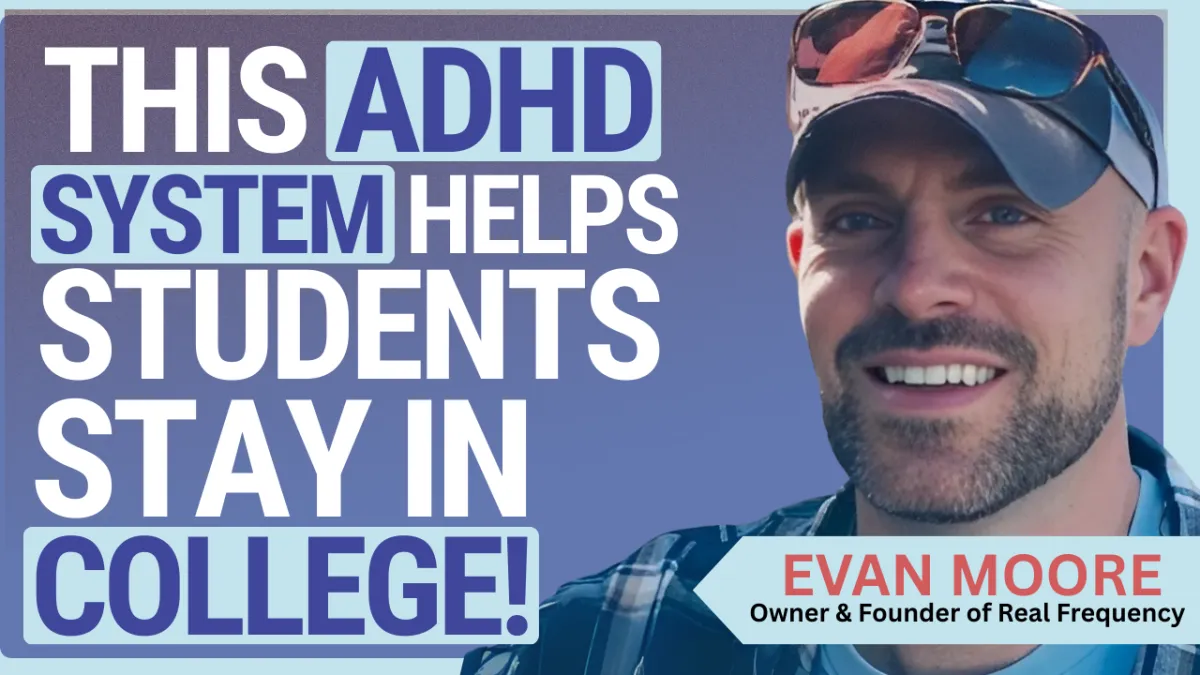Rocket Ship Founder Podcast
Rocket Ship Founder is my weekly podcast dedicated to supporting Founders on their journey. Episodes are short (around 12 minutes) but high value. Each week I dig into a particular topic on Founder life. Special focus on helping ADHD Founders, building great offers and reliable lead flow. Enjoy!
Previous Posts and Podcast Episodes

What Are the Key Steps in Choosing the Right College
Choosing the right college is one of the biggest decisions a student and their family face today. With rising tuition and thousands of students transferring, dropping out, or failing each year, it’s clear the process needs more care.
Many students end up at schools that don’t fit their needs, which causes stress, lost time, and extra costs. That’s why finding the right match matters more than just looking at rankings or price.
Evan Moore is the Owner and Founder of Real Frequency, an adjunct professor at Gonzaga University, and a college consulting company that helps students and families through this process with less stress and more confidence. Built by an entrepreneur with ADHD, Real Frequency focuses on four main areas: college life, academics, finances, and environment.
Evan and his team work with families all over the country. He also teaches strategic thinking at Gonzaga University, helping students turn confusion into clear steps for their college plans. His personal experience with ADHD gives him insight and empathy, making his guidance practical and real.
In this article, you’ll learn how starting early can make a difference, why it’s important to look beyond the usual factors, and how clubs, support services, and self-care help students succeed. You will also discover how understanding ADHD and using accountability can keep students focused.
Why Evan Moore Started Real Frequency for Choosing the Right College
Evan Moore started Real Frequency to fix a serious problem in the college process. Every year, over 750,000 students from middle to high-income families drop out, transfer, or fail. These students often have family support, yet still end up at schools that don’t fit them.
The result is costly. Families often lose money, often around $15,000. Students lose time, confidence, and direction. Colleges also suffer because they lose students they expected to keep for four years.
How Real Frequency Helps in Choosing the Right College
Instead of chasing college rankings or following the usual steps, Real Frequency focuses on what matters to each student. The process starts early, ideally when the student is in 10th or 11th grade, and is built around four key areas:
College Life: Will the student enjoy the campus and feel connected?
Academics: Does the school offer what the student wants to learn?
Finances: Is the cost realistic for the family?
Environment: Does the location and feel of the place match the student’s needs?
This way, students can find colleges where they’ll grow and stay, not just get accepted.
Why Evan Left Administration
Evan worked in college admissions and taught at Gonzaga University. Over time, he saw a clear gap. Students arrived without a real plan. Many didn’t know why they picked the school or what they wanted from it. Once they felt stuck, it was hard to fix.
Evan realized he could help more by starting early. He built Real Frequency to guide families from the start. His goal is simple: help students choose the right school the first time so they stay, grow, and graduate with confidence.
What to Look for When Choosing the Right College
Choosing a college takes more than just looking at rankings, majors, or tuition. A good fit means the student feels comfortable, connected, and supported. Picking the wrong place can lead to stress, dropping out, or starting over. That’s why it’s important to look at the full picture, not just what’s on the brochure.
Focus on Four Key Areas
As mentioned above, a strong college choice includes:
College life
Academics
Finances
Environment
All four should fit well. If even one feels off, it can affect everything else.
Why Clubs and Community Matter in Choosing the Right College
Feeling part of a group helps students adjust better. Clubs, sports, and student activities give them a chance to meet others and build friendships. These connections often make it easier to handle stress and stay focused. It doesn’t matter if it’s soccer, dance, chess, or crochet. What matters is that they feel they belong.
Students often don’t know what options are available until they arrive. That’s why exploring clubs before choosing a school can help avoid surprises later.
Don’t Ignore Support Services
For students who need support, especially those with ADHD, this part matters a lot. College life requires more self-advocacy than high school. Support services should feel welcoming, not difficult to reach.
Key questions to ask:
Is the staff helpful and respectful?
Are services easy to access when needed?
Can the student picture themselves using that help?
A college should feel like the right place, not just look good on paper. When these boxes are checked early, students start with more confidence and are more likely to succeed.
Why ADHD Support and Self-Knowledge Matter in Choosing the Right College
ADHD looks different for every student. Some struggle with focus. Others feel overwhelmed by choices or deadlines. But with the right help, ADHD can become a strength, not a setback.
Support Services Help More Than You Think
Most colleges offer services for students with learning needs. These may be called Disability Support Services or Student Access Services. The names may vary, but the purpose stays the same: to help students succeed.
These offices don’t just support major disabilities. They help students with ADHD, even if it’s mild. Small changes like extra time on tests or a quiet place to study can make a big difference. What matters most is asking for support early and using it when needed.
ADHD Is Not a Problem to Hide
Many students with ADHD feel different. Some think they’re not as smart. That’s not true. ADHD brains work in creative, fast, and unique ways. The challenge is learning how to use that energy well.
Structure helps. So does having someone who understands how ADHD works. That could be a teacher, a coach, or a trusted guide. When students feel supported, they stay more focused and less stressed.
Self-Care Keeps Things on Track
College life comes with less structure and more freedom. That can be hard for students with ADHD. Without the right habits, it’s easy to lose track of time or fall behind.
That’s why self-care matters. Things like:
Regular sleep
Daily movement
Breaks between tasks
Clear to-do lists
These simple steps help students manage their focus and energy. Over time, they build confidence and feel more in control. ADHD isn’t something to fix. It’s something to understand, support, and grow with one step at a time.
Why ADHD Education and Accountability Help in Choosing the Right College
Understanding ADHD takes more than just knowing you have it. Getting a diagnosis is only step one. What really helps is learning how it shows up in daily life and finding ways to work with it.
Know Your ADHD, Don’t Just Name It
Many students don’t fully understand their diagnosis. They may not know what helps them focus or what makes them freeze. Some even forget what’s included in their learning support.
That’s a big loss.
To move forward, they need to:
Learn what their diagnosis means
Notice what makes tasks easier or harder
Spot their strengths and limits
Use their support tools often and well
This awareness brings better results in school, work, and life. It helps when things feel out of control or hard to start.
Accountability Changes Everything
ADHD often makes it tough to begin tasks, even when you want to. That’s where accountability helps. Having someone check in or just being in a shared work space makes it easier to start.
One simple method is body doubling. You sit and work while others do the same, often on Zoom. It sounds small, but it brings focus. You feel less alone and more ready to act.
This kind of setup keeps you from getting stuck. It helps you start and stick with tasks. It also reminds you that support doesn’t mean judgment.
Community Helps You Stay on Track
Living with ADHD can feel lonely. But when you're in a group that understands your brain, things feel lighter. You realize others face the same challenges, no matter their job or goals.
That shared space builds trust. It helps you stay on track, feel more balanced, and keep moving forward one step at a time.
Conclusion
Choosing the right college means more than just looking at rankings or cost. It means finding a place where students feel at home, supported, and ready to learn.
When families focus on college life, academics, finances, and environment together, students have a better chance to succeed and enjoy their time. If even one of these is off, it can lead to stress or dropping out.
Being part of clubs and groups also helps students feel connected. Joining sports, arts, or hobby clubs builds friendships and makes college life easier. Many students don’t know these options until they get there, so exploring them early helps avoid surprises.
Support services matter too, especially for students with ADHD or other learning needs. These services offer help like extra test time or quiet study spots. Knowing how to use these services can make a big difference in a student’s success.
Understanding ADHD and good habits also help students stay on track. Learning how ADHD affects them and using tools like working with others keeps focus and reduces stress. Simple self-care like sleep, moving around, and breaks helps keep energy steady.
Choosing the right college takes time and thought. When students and families look at all these parts early, they set up for success and a happier college experience.
FAQs
How can families start early when choosing the right college?
Starting early means planning in 10th or 11th grade. Early planning gives students time to explore options and prepare without stress.
Does choosing the right college affect mental health?
Yes. A good fit reduces stress and anxiety. Feeling connected helps students enjoy college and focus on learning.
How important is visiting campuses when choosing the right college?
Visiting helps students feel the environment and culture. It gives a clearer sense if they will be happy there.
Should students consider career goals when choosing the right college?
Absolutely. Colleges that offer strong programs in their interest help students build skills and find jobs faster.
What role do parents play in choosing the right college?
Parents provide support and guidance but students should make the final choice. It’s their experience and growth.
STAY CONNECTED & KEEP LEARNING
Mastering focus and building a thriving business with ADHD doesn’t happen overnight, and you don’t have to do it alone.
Subscribe to the ADHD Entrepreneurs Newsletter on LinkedIn to get stories, tips, and ADHD-friendly strategies straight to your inbox to help you stay out of overwhelm, reclaim your focus, and achieve your full potential.
Copyright 2025 Steve August Coaching | All Rights Reserved

